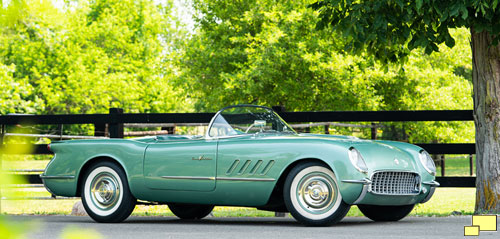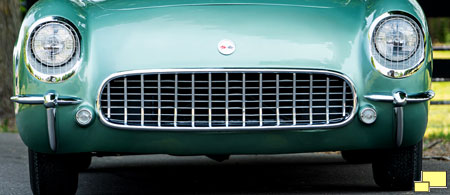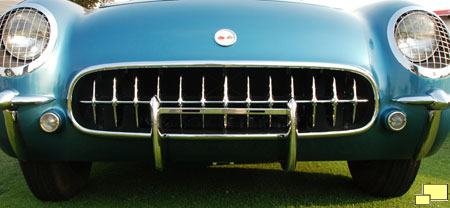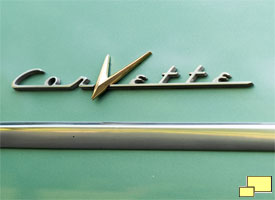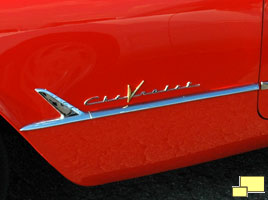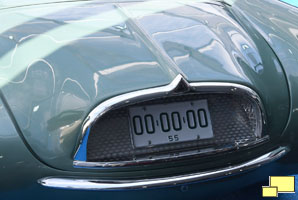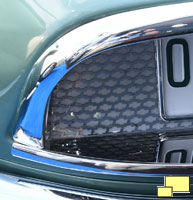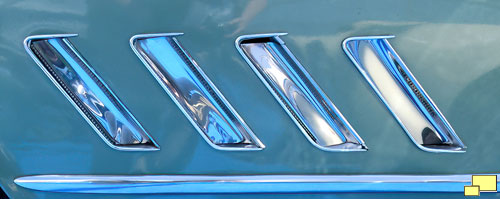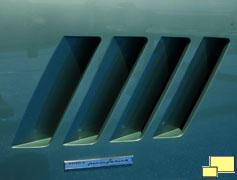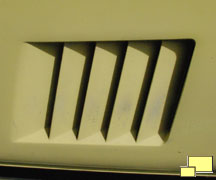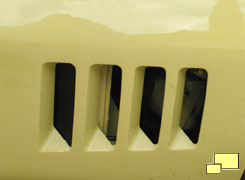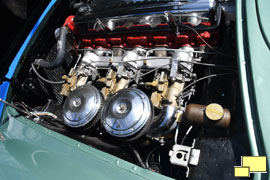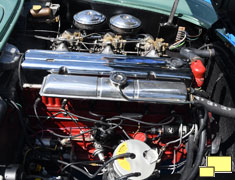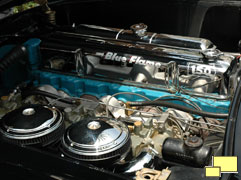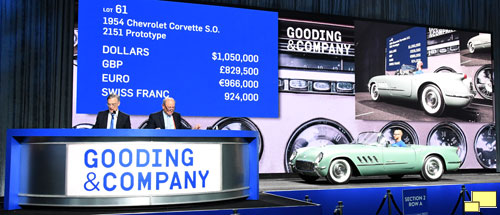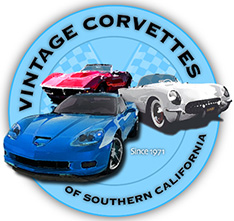
|

|
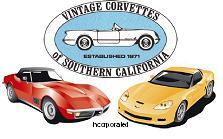
|
Return to Vintage Corvettes Home Page
Return to Vintage Corvettes Features Page
Publisher, The Corvette Story
1954 Corvette Prototype
Prototype Corvettes offer a fascinating glimpse into the minds of the stylists who creted them. What other ideas did they consider?
As the 1954 Corvette model year was coming to a close, the design department experimented with ideas for the 1955 and subsequent Corvettes.
Putting the ideas into flesh and blood reality was the job of SO 2151, shown here. "SO" was short for "Shop Order"
You may have heard the expression "a camel is a horse designed by a committee" and it applies here to the 1954 SO 2152 Corvette. The car looks like everybody got their say in how it would look and the results are not pleasing.
In most cases with SO 2151, the ideas used did not make it into production. Above is the SO 2151 grill and below is the much loved 13 tooth chrome grill on a stock 1955 Corvette. The clear winner is the stock grill. It had been used on the 1953 thru 1957 Corvettes; 1958 thru 1960 featured a nine tooth version.
One item that did find its way to the production Corvette is the side script with the gold "V" emphasized. The SO 2151 was thicker with a different script and spelled out "Corvette" instead of "Chevrolet" as on the 1955 production Corvette. Also the emblem is located on the doors of SO 2151; the production Corvette had it on the front fenders. The gold "V" mission was to call attention to the V8 engine which made it's first appearance in a Corvette in 1955.
This is odd. The SO 2151 trunk had a hump of sorts, emphasized by chrome trim. It did not appear on the 1955 or subsequent Corvettes, which your author would characterize as being a "good thing". Right: Notice the classic Chevy bow tie in the license plate surround. A 1954 version of the modern "easter egg"?
Above: SO 2151 featured four slightly tilted vertical vents on the front fender. This had been a common styling feature, especially on Italian cars, in the 1960s. The SO 2151 version were oversized and glitzed to the max with chrome and trailing edge speed accents.
Below, left: 1966 Ferrari 275 GTB featured a more subtle form. Middle: The 1967 Corvette interpretation was similarly understated and was only seen on that model year. Right: The 1968 and '69 Corvette had comparable, although non-functional vents.
Here is some interesting insight on how designers work. Notice on the left side (above) the Corvette script is lower on the door, close to the chrome trim line. On the right side (below) it is nearer to the middle of the door. It is also a lighter script and closer to what was eventually used on the production 1955 car except that the script was "Chevrolet", not "Corvette".
Also the chrome level on the right side vertical vents on the front fender (bottom) was more low-key than the left side.
The method behind the madness was to give the designers samples to help them come to the right styling decisions.
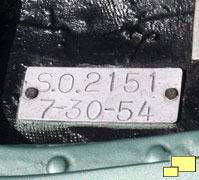 The identification plate for the Corvette prototype. It was initially "SO 2000" but was updated to 2151 by the design department in 1954. It also received an updated chassis.
The identification plate for the Corvette prototype. It was initially "SO 2000" but was updated to 2151 by the design department in 1954. It also received an updated chassis.
SO 2151 featured the Blue Flame Six engine; it was painted red however, indicating that it was a test engine. An updated cam was added which was good for 5 or 10 extra horsepower. A standard 1954 Blue Flame engine is at the right.
2023 Gooding & Company Pebble Beach Auction
SO 2151 Being auctioned at the 2023 Pebble Beach Gooding & Company auction. The pre-auction estimate was $1,500,000 to $2,000,000 but with a top bid of $1,050,000, it was a no-sale.
The car had a lot going for it. Its provenance could not be denied: GM styling chief Bill Mitchell was involved in the project. It has consequential role in the history of the early Corvette and is one of the few cars in private hands that can make that claim.
But it also carries a lot of negative baggage. For starters, many of the ideas expressed are just bad with the hump in the trunk leading the list. Also the build quality was horrible which is a common situation regarding concept cars. If you ask me (but nobody does, of course) the consigner could have accepted the $1,050,000 bid without regret.
Click on any image to view a larger image
